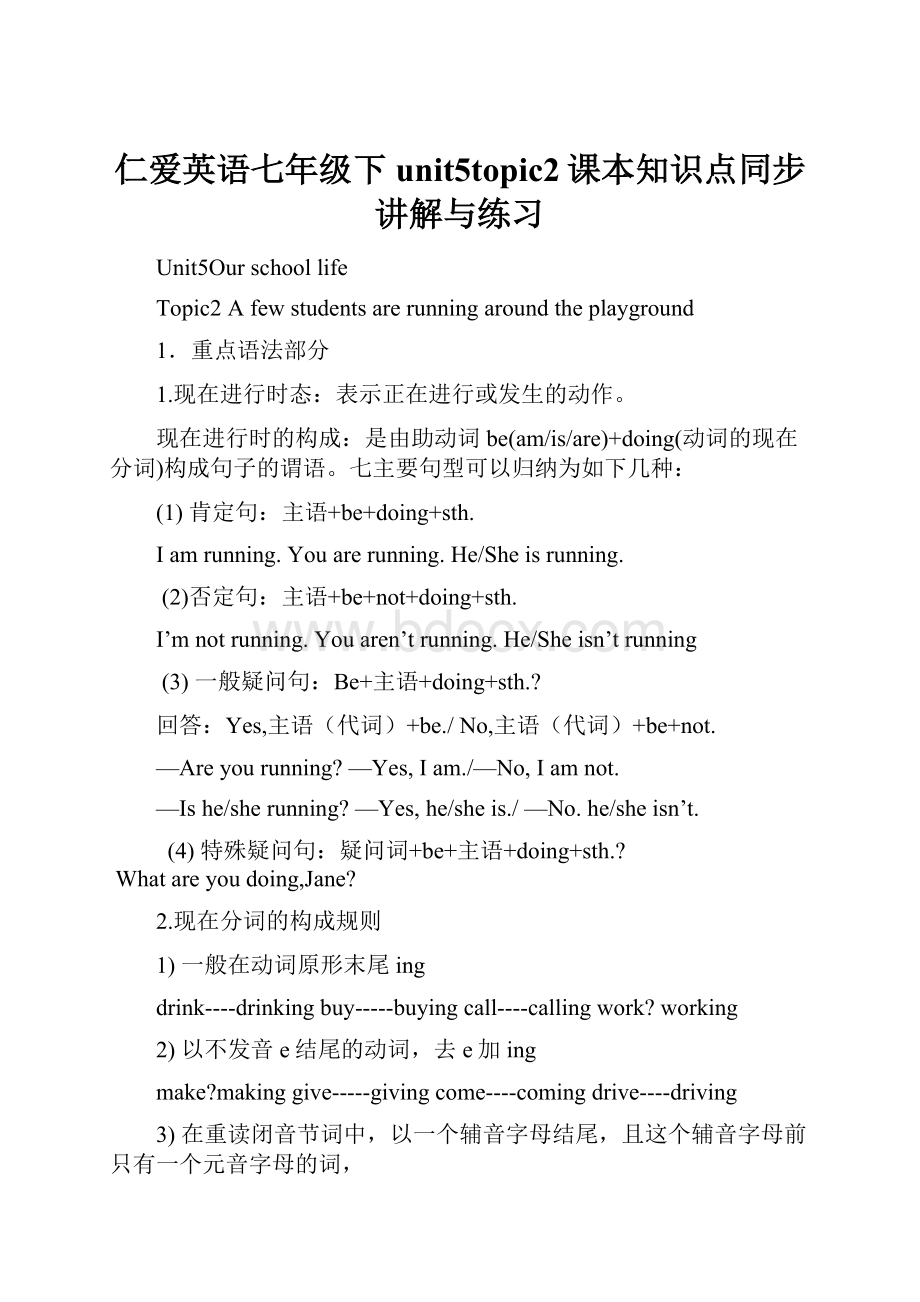仁爱英语七年级下unit5topic2课本知识点同步讲解与练习.docx
《仁爱英语七年级下unit5topic2课本知识点同步讲解与练习.docx》由会员分享,可在线阅读,更多相关《仁爱英语七年级下unit5topic2课本知识点同步讲解与练习.docx(15页珍藏版)》请在冰豆网上搜索。

仁爱英语七年级下unit5topic2课本知识点同步讲解与练习
Unit5Ourschoollife
Topic2Afewstudentsarerunningaroundtheplayground
1.重点语法部分
1.现在进行时态:
表示正在进行或发生的动作。
现在进行时的构成:
是由助动词be(am/is/are)+doing(动词的现在分词)构成句子的谓语。
七主要句型可以归纳为如下几种:
(1)肯定句:
主语+be+doing+sth.
Iamrunning.Youarerunning.He/Sheisrunning.
(2)否定句:
主语+be+not+doing+sth.
I’mnotrunning.Youaren’trunning.He/Sheisn’trunning
(3)一般疑问句:
Be+主语+doing+sth.?
回答:
Yes,主语(代词)+be./No,主语(代词)+be+not.
—Areyourunning?
—Yes,Iam./—No,Iamnot.
—Ishe/sherunning?
—Yes,he/sheis./—No.he/sheisn’t.
(4)特殊疑问句:
疑问词+be+主语+doing+sth.?
Whatareyoudoing,Jane?
2.现在分词的构成规则
1)一般在动词原形末尾ing
drink----drinkingbuy-----buyingcall----callingwork?
working
2)以不发音e结尾的动词,去e加ing
make?
makinggive-----givingcome----comingdrive----driving
3)在重读闭音节词中,以一个辅音字母结尾,且这个辅音字母前只有一个元音字母的词,
先双写这个辅音字母,再加ing
put?
puttingplan----planningswim----swimmingsit---sitting
4)以ie为重读音节结尾的动词,把ie变为y,再加ing。
die?
dyinglie?
lying
5)以er音节结尾的动词,先去e再加ing
prefer?
preferingwater?
watering
6)以er结尾的动词,如果是重读音节结尾,先双写r再加ing;如果不是重读音节结尾,
直接加ing。
Prefer?
preferringwater?
watering
7)以y结尾的动词变为现在分词时,y不变,直接加上ing.
play?
playingstudy?
studyingfly?
flyingbuy?
buying
3.什么情况下用现在进行时
1)表示现在或说话时正在进行的动作,常与now,atthemoment连用,有时也和look,listen,
It’s!
...o’clock.等连用。
e.gI’mreadingabooknow.
2)表示当前一段时间内的活动或现阶段正在进行的动作。
e.gThey’reworkingonafarmthisweek.
3)表示经常反复的动作,常与always等频度副词连用,含有赞赏、厌恶、不满等感情色彩.
e.g.Sheisalwayshelpingothers.她总是帮助别人。
(赞赏)
4)某些行为动词的现在进行时形式可以表示将来,常常有意图,安排或打算的含义,并且可与表将来的时间状语连用,仅限于少数动词(多为表示位置移动的动词),如go,come,fly,return,arrive,leave,stay等。
e.gTheyareflyingtoLondonthisafternoon.WearegoingtoHongKongtomorrow.
Steveiscomingtomorrowevening.
口诀:
Look,Listen是标志,现在进行正发生;
有时now在句中现,“be+v-ing”时态成。
若问be用何形式,须看主语数、人称。
He/Sheis,Iam.We,you,they后are紧跟。
v-ing形式更好记,三种构成要分清。
一般问句be提前,be后加not否定成!
SectionA
1.重点词汇
runaroundtheplayground绕着操场doone’shomework做家庭作业WatchTV看电视makecards做卡片wouldliketodosth想要做某事playbasketball打篮球
seeyousoon一会见onthetelephone在电话中intheclassroom在教室里
playcards打牌computerroom电脑室diningroom餐厅
teachers’office教师办公室classroombuilding教学楼inthelibrary在图书馆
二.重点详解
1.Whatareyoudoingnow?
你现在在做什么?
这是一个由what引导的特殊疑问句,用于问别人此刻正在做什么事情。
2.Areyoudoingyourhomework?
你在做作业吗?
是现在进行时的一般疑问句,肯定回答:
Yes,主语+Be;否定回答:
No,主语+be+not.(Yes,Iam./No,I’mnot.)
3.wouldyouliketodoplaybasketball?
Wouldyouliketo.....?
你想或愿意做......吗?
相当于Doyouwanttodo......?
4.dosomecleaning打扫卫生。
相似的结构:
dosomeshopping买东西
dosomereading读书dosomefishing钓鱼dosomecooking做饭
SectionB
1.重点词汇
Englishworkbooks英语练习册lookfor寻找howlong多久twoweeks2周
ontheshelves在书架上returnsthontime准时归还某物Englishnewspapers英语报纸
lostandfound失物招领处IDcard身份证familyphoto全家福callsb打电话给某人
studentcard学生卡
二.重点详解
1.MayIborromsomeEnglishworkboos?
我可以借一些英语练习册吗?
MayIborrow........?
是表达请求允许的句型。
may在此表示请求对方许可,常用Yes,please./Yes,ofcourse./Certainly.等来做肯定回答。
否定回答用mustn’t.
E.g.MayIcomein?
----Yes,pleae.“可以,请吧”
否定回答为:
\No,youmustn’t.“不,不可以”
MayIuseyourphone?
我能用你电话吗?
No,youmustn’t.
2.Thegirlloosforthebooksontheshelves.女孩在书架上找书。
①Lookfor是“寻找”的意思,强调的是找的动作;
上学期学过的单词find意思是“找到、发现”强调的是找的结果。
E.g1.Iammypeneverywhere(到处),butIcan’tit.
Whatareyou________________?
----Iam___________myschoolbag.
②ontheshelves意为“在书架上”,shelf复数为shelves.
3.HowlongcanIkeepthem?
我能借多久
keep,borrow和lend都有“借用”的意思,但是区别之处在于:
borrow表示主语借进borrowsth.fromsb.向某人借某物
e.g.Youcanborrowthisbookfromthelibrary.
MayIborrowyoureraser?
lend表示主语借出lendsb.sth.(lendsth.tosb.)把某物借给某人
e.gCanyoulendyourcartome?
Theyoftenlendustheirball.
keep表示借多长时间,借多久,意为“保存,保留”
keep和borrow,lend区别是borrow和lend是瞬间动词,而keep是延续性动词,表示借一段时间,后常跟上一段时间
e.gYoumaykeepthisbookfortwoweeks.
-----HelloJane,MayI_______yourbike?
-----I’msorry,butmybikeisbroken(坏了).YoucanaskLileiforit,
he’ll______ittoyou.
------Ok,Iwilltry.
Howlong意为“多长时间,多久”用于提问一段时间
howoften意为“多久一次”用于提问频率。
e.g.HowlongcanIkeepit?
我能借多久?
HowofendoyouhaveEnglishclasses?
---Twiceoneweek.
与how相关的短语:
howoften多常howmany多少howmuch多少钱howold多大
Iwillkeepthebookfor3weeks.(划线部分提问)
willyoukeepthebook?
Heusuallygotothezooonceaweek.(对划线部分提问)
doesheusuallygotothezoo.
4.Youmustreturnthemontime.你必须准时归还。
ReturnV(动词)
?
“归还”return=giveback。
returnsth.(tosb.)=givesth.backtosb.把某物还给某人。
Pleasereturnthebooktomenow.=Pleasegivethebookbacktomenow.
?
returnto“回到„”,相当于comebackto„
E.gHewillreturnfromAmericanextmonth.
ontime“准时,按时”强调不早不迟到达
intime:
“及时”,强调在规定的时间以前到达
e.g.Wemustgotoworkontime.
Thestudentscangetthereintime.
用intime/ontime填空。
Hegoestobed___________everyday.
5.Thankyouallthesame.“还是要谢谢你。
”=Thankyouanyway.
是你向别人寻求帮助,但别人无法帮助你时你作的回答。
6.Excuseme,doyouhaveanyEnglishnewspapers?
Some和any用法:
some常用于肯定句,any常用否定句和疑问句
--Ihavesometeahere.我这儿有些茶叶.
--Ican’tseeanytea.我没看见茶叶.
--Doyouhaveanyfriendsatschool?
你在学校有些朋友吗?
但在表示建议,反问,请求的疑问句中,或期望得到肯定回答时,多用some而不用any.如:
Wouldyoulikesomecoffee?
你要不要来点咖啡?
Whataboutsomefruitjuice?
来点水果汁如何?
用some和any来填写下面句子。
(1).Ihave_____________goodfriendsinmyclass.
(2).Isthere____________waterinthebottle?
(3).Doyouhave____________________money?
(4).Theydon’thave______________timetogothere.
(5).Thereare________________cakesonthetable.
(6).Idon’thave__________________milkforbreakfast.
7.MichaelandagirlaretalkingattheLostandFound.
LostandFound“失物招领处”作为标志时,除了and,其他首字母要大写。
8.CanIhelpyou?
是服务员的常用语,不同场合具有不同的含义。
类似的还有:
MayIhelpyou?
/WhatcanIdoforyou?
/IsthereanythingcanIdoforyou?
等
9.What’sinit?
里面有什么
What’sin+sth表示哪里有什么东西
E.gWhat’sinyourpurse?
钱包里有什么东西?
10.Hereisawallet.此句是倒装句。
Here,there等副词置于句首时,经常与go,come等动词连用。
主语如果是普通名词,全句需要完全倒装,主语如果为代词,不需要倒装。
e.g.Theregoesthebell.铃响了。
Herehecomes.他来了。
There___________他在那儿。
Here________________这就是那只猫。
SectionC
一.重点词汇
showsbaround带领某人参观ontheplayground在教师
runaroundtheplayground绕着操作跑haveasoccergame举行足球赛
playbasketball打篮球swimmingpool游泳池overthere那里
playping-pong打篮球intheclassroom在教师里havelessons上课
doone’shomework做家庭作业writealetter写信afewstudent几个学生
cleantheblackboard擦黑板readEnglishnewspapers读英语报
drawpictures画画listentomusic听音乐playgames玩游戏
二.重点详解
1.MissWangisshowinganewstudentaroundtheschool.
showsb.around领某人参观;带某人巡视
e.g.Timisshowingusaroundthefarm.Tim正带着我们参观农场。
2.Afewstudentsarerunningaroundtheplayground.
Afew在这里是表示“有几个学生”的意思。
few,little,afew,alittle的用法讲解
few修饰或代替可数名词复数,意为“很少,几乎没有”,表示否定含义
little修饰或代替不可数名词复数,意为“很少,几乎没有”,表示否定含义
afew修饰或代替可数名词复数,意为“一些,少许”,表示肯定含义
alittle修饰或代替不可数名词复数,意为“一些,少许”,表示肯定含义
e.g.afewapples几个苹果fewapples几乎没有苹果
alittlewater一点儿水littlewater几乎没有水
alittle+adj.表示“有点儿......”alittleeasy有点容易
()1.Thisisaveryoldsong,so_________youngpeopleknowit.
A.fewB.littleC.afewD.alittle
()2.Therearen’tmanyorangeshere,butyoucantake_________if(如果)youwantto.
A.fewB.afewC.alittleD.little
()3.Now___youngpeoplewalktoschool,theyalwaysgotoschoolbybike.
A.fewB.afewC.alittleD.little
3.Heiswritingaletter写信
write(aletter)tosb.给某人写信.
TomiswritingtoKangkang.Tom在给康康写信。
write(aletter)backtosb.给某人回信
KangkangiswritingbacktoTom.康康在给Tom回信。
4.Heiscleaningtheblackboardatthebackoftheclassroom.
Atthebackof意为“在......后部”。
指在范围内部的后部
atthebackofahouse在房子的后部
5.atthemoment=now“此刻,现在”,常用于现在进行时
6.Japanese:
adj日本的,日本人的,日语的n.日本人,日语
当Japanese表示日本人时,是可数名词,单复数同形(与Chinese用法相同),当Japanese表示日语时为不可数名词。
e.gTwoJapaneseandthreeChineseareswimmingintheswimmingpool.
SectionD
1.重点词汇:
Intheroom在房间intheoffice在办公室inthegym在体育馆
lovedoingsth喜欢做某事talktosb和某人交谈ontheGreatWall在长城上
二.重点详解
1..Herearesomephotosofhis.这儿有一些他的照片。
名词+of+名词性物主代词/名词所有格-------双重所有格
e.gafriendofSam’s萨姆的一个朋友afriendofmine我的一个朋友
2.Helookshappybecausehelovesswimming.
①lovedoingsth习惯性的爱好和习惯意思为“喜欢做某事”
同义词组为:
likedoingsth
lovetodosth一次性的动作或目前想做的事
e.gShelovesreadinginbed.Ilovetogoswimmingtoday.
②because引导原因状语从句,常用来回答why问句。
Because与so不能同时出现。
e.g.WhydoyouwanttovisittheGreatWall?
?
Becauseit’sverywonderful.
3.Inpicture3,heistalkingtoaJapanesegirlontheGreatWall.
talk“交谈”,常用的短语talkto/withsb.“与某人交谈”
巧辩异同talk,say,speak与tell
①talk“交谈”,表示通过谈话方式交换意见、消息等。
②speak“说话”,强调开口发声,后常接某种语言。
③say“说”,强调所说的话的内容。
tell“告诉”,有时兼含“嘱咐”“命令”等。
tellatruth说真话,tellalie说谎,tellastory讲故事等固定搭配。
用talk,say,speak,tell填空。
Theteacheraskusnotto______witheachotherintheclass.
MayI_____toJane?
Hecan_____JapaneseandEnglish.
Whatdoeshe______intheemail?
4.also与too都有“也”的意思,also用在句中,too用在句末
e.gHelenisalsoastudent.
Ihavelonghairandshehaslonghair,too.
典型习题:
(1)—Excuseme,howlongmayI______thebook?
---Fortwoweeks.
A.borrowB.keepC.lendD.buy
(2)---Hi,XiaoQi,IwouldliketogotothezoothisSunday.
Ilikewatchinganimalsbest.
----I_____likewatchinganimalsbest.
A.tooB.eitherC.alsoD.and
(3)----Couldyoucomeplease?
Iwantsomehelp.
----_______
A.Yes,Icould.B.You’rewelcome.
C.Sure,I’mcomingnow.D.That’sallright.
(4)---Bob,mayI_____yourMP4?
---Sure,butyou’dbetternot______ittoothers.
A.lend,lendB.lend,borrowC.borrow,borrowD.borrow,lend
(5)She’s_____herpurse,butshecan’t______it.Let’shelpher.
A.find;lookforB.lookingfor;find
C.lookfor;findD.finding;lookfor
(6)----Whatisyourmotherdoing?
----Mymother